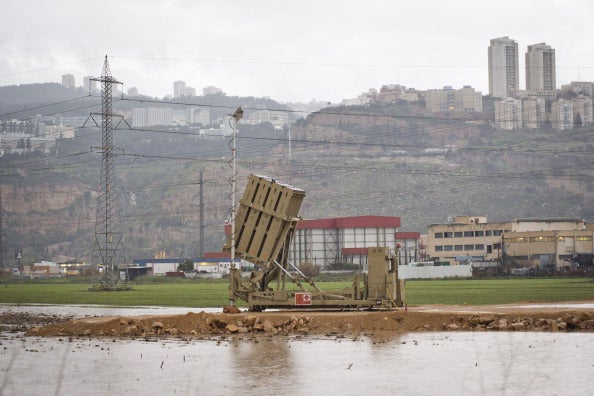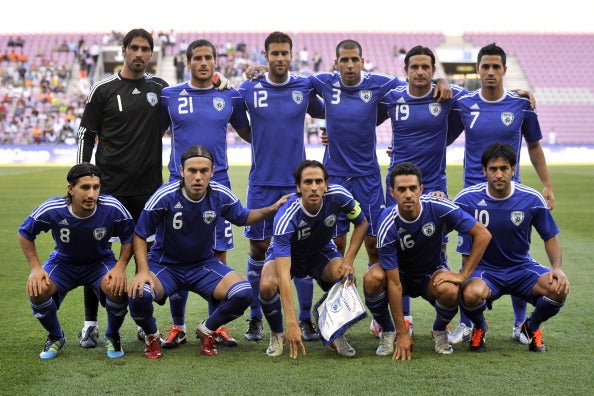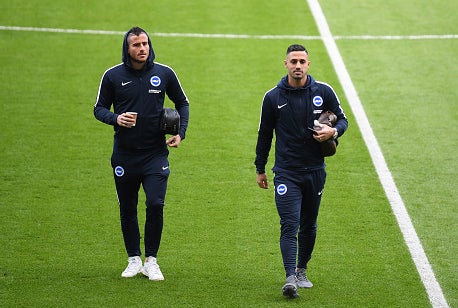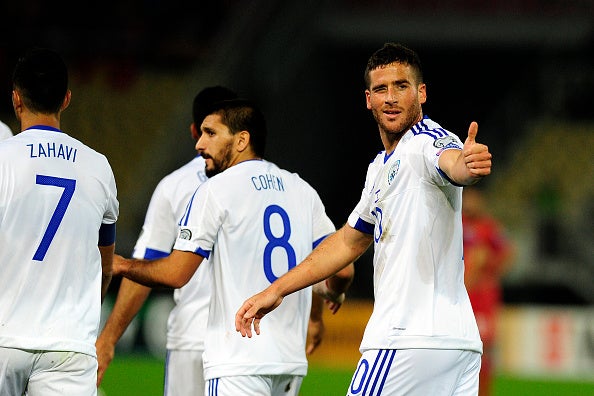Scotland vs Israel: Tomer Hemed one step away from fulfilling his final footballing dream
Exclusive interview: A career which began at the same time his city was bombed by Hezbollah, nears its end at international level with a final chance to take the country towards its first major tournament

Your support helps us to tell the story
From reproductive rights to climate change to Big Tech, The Independent is on the ground when the story is developing. Whether it's investigating the financials of Elon Musk's pro-Trump PAC or producing our latest documentary, 'The A Word', which shines a light on the American women fighting for reproductive rights, we know how important it is to parse out the facts from the messaging.
At such a critical moment in US history, we need reporters on the ground. Your donation allows us to keep sending journalists to speak to both sides of the story.
The Independent is trusted by Americans across the entire political spectrum. And unlike many other quality news outlets, we choose not to lock Americans out of our reporting and analysis with paywalls. We believe quality journalism should be available to everyone, paid for by those who can afford it.
Your support makes all the difference.Tomer Hemed was 19 years old when Hezbollah launched 93 Katyusha rockets at Haifa. And over the course of the following 34 days which the Second Lebanon War lasted, a further 4,000 rockets were launched in the direction of the city.
Half of Haifa’s residents fled their homes, and the start of the Israeli Premier League season was postponed after a missile landed on the porch of the city’s municipal Kiryat Eliezer Stadium.
The squad themselves camped out 64km to the south, training for a Champions League qualifier against Liverpool, while many of their families found safety in shelters.
It was the year Hemed broke into the first team at Maccabi Haifa, the club he had supported all his life having grown up in Kiryat Tiv’on, a small Jewish village on the city’s fringes. Had a ceasefire not been agreed, he may have been called into the army's reserves. Instead, Hemed made his European debut at Anfield three days later.
***

12 years on, Haifa is a rare representation of coexistence in a country otherwise suffocated by sectarianism and segregation. A rare idyll where Hebrew and Arab dialects are muddled, cuisines are fused not by means of oriental fashion, and mosques and churches stand alongside synagogues. A place which provides an antidote to Israel’s overbearing politics and a city that can even be described as peaceful.
At Maccabi Haifa, one of Israel’s oldest and most illustrious clubs, teenagers of all race and religions play and pray alongside one another. It is where Hemed’s career started at 13-years-old, and where he met his best friend, Beram Kayal, now of Brighton. In so many ways their friendship – between an Israeli Jew of Polish-Syrian descent and an Israeli Arab – epitomises a modern image of Israel which many have never seen, nor imagined even exists.
It’s the place which fostered Hemed’s positive outlook, taking pride in his own achievements and his religion, rather than focusing on the country’s shortcomings. But what of the people who choose only to “focus on the bad times?" Who hold inconsolable perceptions of Israel and to whom the idea of a national team from the Jewish capital featuring a number of Arab-Muslims absurd?
Hemed pauses. “I just tell people to go there and see how good it is. If we look at the life between Jewish and Muslims and Christians, people can go to Israel and see that people are living together so good, especially if it’s Haifa where I used to play.
“The football clubs in Israel are a good example. We are all friends from different religions playing together. In the national team, there are a lot of Muslim and Jewish players representing the country together, living together, sharing their lives together.
“Of course, unfortunately, there are some areas where it’s very complicated and difficult, but not all the country is like that.”

Haemorrhaged in the north of Israel, just over an hour from the Golan Heights, Haifa is removed from Hamas’ rocket fire which enveloped Israel last week. On the same day 500 mortars and missiles were directed at the country from Gaza, the national team were preparing for their final friendly - a 7-0 thrashing of Guatemala - before arriving in Glasgow for Tuesday’s decisive Nations League tie against Scotland.
Israel’s eclectic team only need to take one point from Hampden Park to win promotion from Group C1, having defeated Scotland 2-1 in Haifa last month. A feat which would be historic for a country which has only ever won one major trophy - the Asia Cup in 1964. Even that minor success was won almost by default, after eleven predominantly Muslim countries pulled out of the competition in protest.
Now, there is the very real prospect that success for the national team could, albeit temporarily, bring people in the country closer together in the way only sport’s uncanny leverage on the mind can. Such as could be seen in neighbouring Syria just last year during their improbable World Cup Qualifying campaign, when pro and anti-Assad players combined on the pitch and were cheered on in unison throughout the divided streets of Damascus.
Israel’s national team are a metaphor for a modern nation: captained by Bibras Natkho, a Sunni Muslim whose father served as a patrol guard at the border, a goalkeeper, Ariel Harush, who featured in a documentary standing against the racism of his own fans towards Beitar Jerusalem two new Chechnyan-Muslim players, and Hemed and Kayal, best friends fronting campaigns promoting coexistence.
So success against Scotland could provide so much more than promotion to League B and a step towards the Euros: the promise of bringing a country so fraught just fractionally closer.

“It’s something the whole country has been waiting for,” Hemed says. “The biggest dream I have had since I was a kid was to qualify for the national team for a big tournament. I just want to be part of the team that achieves it,” he added pointedly, knowing now that at 31, Euro 2020 would almost certainly be his last chance.
“Still now at my age, and after a lot of games, still every time that I represent the country, I feel like it’s the first time. It’s the biggest honour that I can feel in football.”
The Israeli FA’s technical director played down speculation this week that his team might be distracted by the anti-Israel protestors which customarily follow the national team to matches and are set to make an appearance in Scotland. Rifling off the typical antisemitic tropes which trail the team, most notably on an away visit to Budapest in 2012, when Hungarian fans raised Iranian flags, made Nazi salutes and chanted “stinking Jews” and “Heil Benito Mussolini” before Hemed came off the bench to score a late equaliser.
But while Hemed is aware of the ugly ongoings in the last year – the concerning re-emergence of antisemitism both in the UK and abroad, heightened tensions with Hamas, the Pittsburgh Synagogue massacre – he chooses not to disassociate himself like most footballers. Instead, he focuses his efforts with a cautious optimism that “one day things can be much better.”
“In the end, people can choose what they look for. They can focus on the problems or they can look at those good examples. There sad things which are happening all over the world and I’m not saying it’s only been against Jews, it’s been against Muslims or Christians too.

“We have to respect each other as people, it doesn’t matter about your religion or where you’re from. It’s so sad to see that still in our world things like this are happening. I can't understand why people do these things, how they can judge because of religion and colour.”
Of course, on any issue which incorporates Israel, vociferous debate and criticism is unavoidable. So perhaps it is fitting that this multicultural team will play one of the most important matches in their history in a city which has outgrown the sectarianism which still strangles Israel.
A fixture which will be played at Hampden Park, just 15 minutes from where ‘Hezbollah’ was spray-painted onto the pavement outside the entrance to Glasgow's Garnethill Synagogue in 2006, at the same time as the warheads hit Haifa and the stadium where Hemed first watched football as a small child and his career begun.
Where Israel’s celebrated striker now has his last chance to take a step towards his final footballing dream and don Israel’s blue and white on the grand stage. To achieve the feat the country has waited for for 70 years.
Join our commenting forum
Join thought-provoking conversations, follow other Independent readers and see their replies
Comments